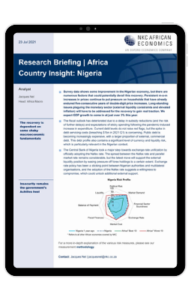Africa | Country Insight: Nigeria

Progress in passing the Petroleum Industry Bill (PIB) and official adoption of the Nafex rate are two significant policy steps in the rights direction. However, with elevated price inflation and just 30.6 million Nigerians out of a population of nearly 210 million considered fully employed, households are under severe strain. Long-standing issues plaguing the monetary sector (external liquidity constraints and elevated inflation) will have to be addressed for the recovery to gain real traction.
What you will learn:
- A tense political environment has encouraged authorities to delay the suspension of subsidies, but fiscal pressures and the regulatory requirements stemming from the PIB could force the government to scrap this form of financial support.
- Public debt is becoming increasingly expensive, with a larger proportion of external, commercial debt. This debt profile also contains a significant level of currency and liquidity risk, which is particularly relevant in the Nigerian context.
- Lagos is by far the largest consumer market in West Africa, with spending totalling an estimated N13.2trn in 2020. Looking ahead, we expect the strongest growth in consumer spending to take place in Abuja and the smaller markets of Port Harcourt and Onitsha.
Tags:
Related Services

Post
US Key Themes 2026: Exceptionalism amid fragmentation
US exceptionalism is alive and well, and that won't change in 2026.
Find Out More
Post
Global Key themes 2026: Bullish on US despite AI bubble fears
We anticipate another year of broadly steady and unexceptional global GDP growth, but with some more interesting stories running below the surface.
Find Out More